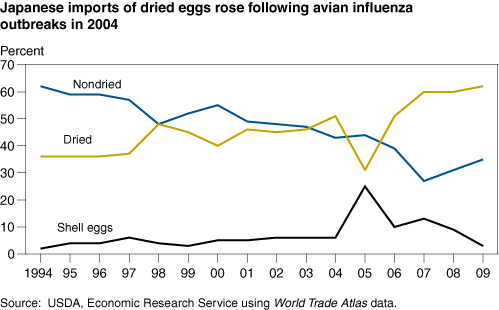Avian Influenza Boosted Japan’s Imports of Dried Egg Products
- by Fawzi Taha and William Hahn
- 12/1/2011
Animal disease outbreaks can have major trade impacts. ERS analysis of the effects of the 2004 outbreak of highly pathogenic avian influenza (HPAI) H5N1-virus in Japan showed evidence of a willingness of Japanese consumers to substitute-for food safety reasons- processed dried egg products for fresh shell eggs. These changes in preference affect U.S. exports of shell eggs and egg products.
ERS researchers divided Japan's egg imports into shell eggs, nondried egg products, and dried egg products. Fresh eggs are the most likely to carry the virus on the shell surface as well as inside, while dried egg products are produced through heating that kills the virus.
Data on Japan's egg imports following the outbreak showed a change in demand in shell eggs and dried egg products. In the post-HPAI period, Japanese importing firms viewed the two products as closer substitutes for each other. In addition, the demand for each class of products became more sensitive to price changes. Import demand for the safer dried egg products increased and import demand for the nondried egg product and shell eggs weakened.
Despite reduced demand for shell eggs, shell egg imports still rose sixfold in 2005, due to the loss of Japanese layers to HPAI. The U.S. supplied the largest share--38 percent--valued at $5.7 million. After 2006, as Japan's layer flocks began to recover, shell egg imports decreased dramatically and imports of dried egg products rose.
Within the dried-egg product category, demand for U.S. exports of dried egg whites increased from 6 percent of Japan's egg imports in 2004 to 42 percent (worth $6.03 million) in 2007. By 2010, U.S. global export volumes of dried egg whites increased fourfold from 2004 (worth $13.17 million) and U.S. shipments to Japan rose more than twelvefold. The study has wide-ranging implications for global egg markets because it provided the first evidence for a possible substitution of dried egg products for shell eggs.
This article is drawn from:
- 'Highly Pathogenic Avian Influenza Impacts on Japan's Import Demand for Shell Eggs and Processed Egg Products'. (2011). World's Poultry Science Journal. Highly Pathogenic Avian Influenza Impacts on Japan's Import Demand for Shell Eggs and Processed Egg Products,' by Fawzi A. Taha and William F. Hahn, in World's Poultry Science Journal, Vol. 67, March 2011, pp 115-130..


